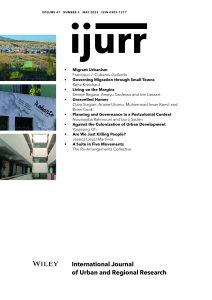Based on qualitative long-term fieldwork conducted in a peripherally located small town in East Germany, this article compares the dispersal of repatriates from the former Soviet Union with that of recent refugee arrivals. It shows that in this small town the dispersal and local governance of refugees builds on previous approaches to dealing with repatriates. Such approaches repeatedly result in cycles of localized distribution and subsequent small-scale segregation, short-term integration activities, the detachment of both groups from the town and, finally, migrants’ subsequent outmigration and relocation to other (mostly larger) cities. To make sense of this path dependency in terms of its specific patterns and characteristics, and to explore the relationships between dispersal, local policy framings, and in- and outmigration to and from small towns, I apply a studying through dispersal approach. This approach reveals that dispersal is an important factor in making and unmaking local migration policies. It can turn small towns into productive sites for migration governance, often transforming them into mere waiting zones and transit spaces. This not only continues migrants’ experiences of displacement but also impacts on the image of the small town, where migrants themselves may not want to reside permanently.

